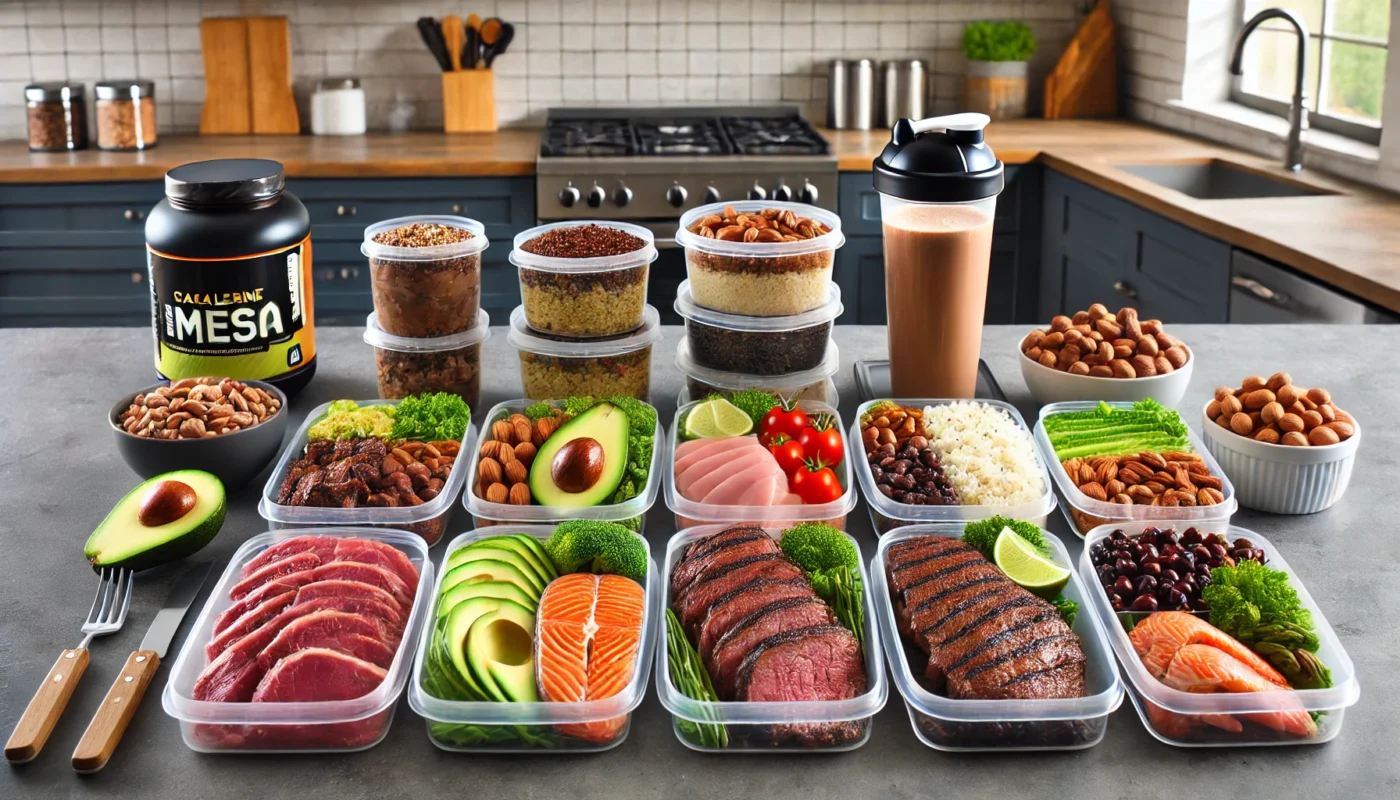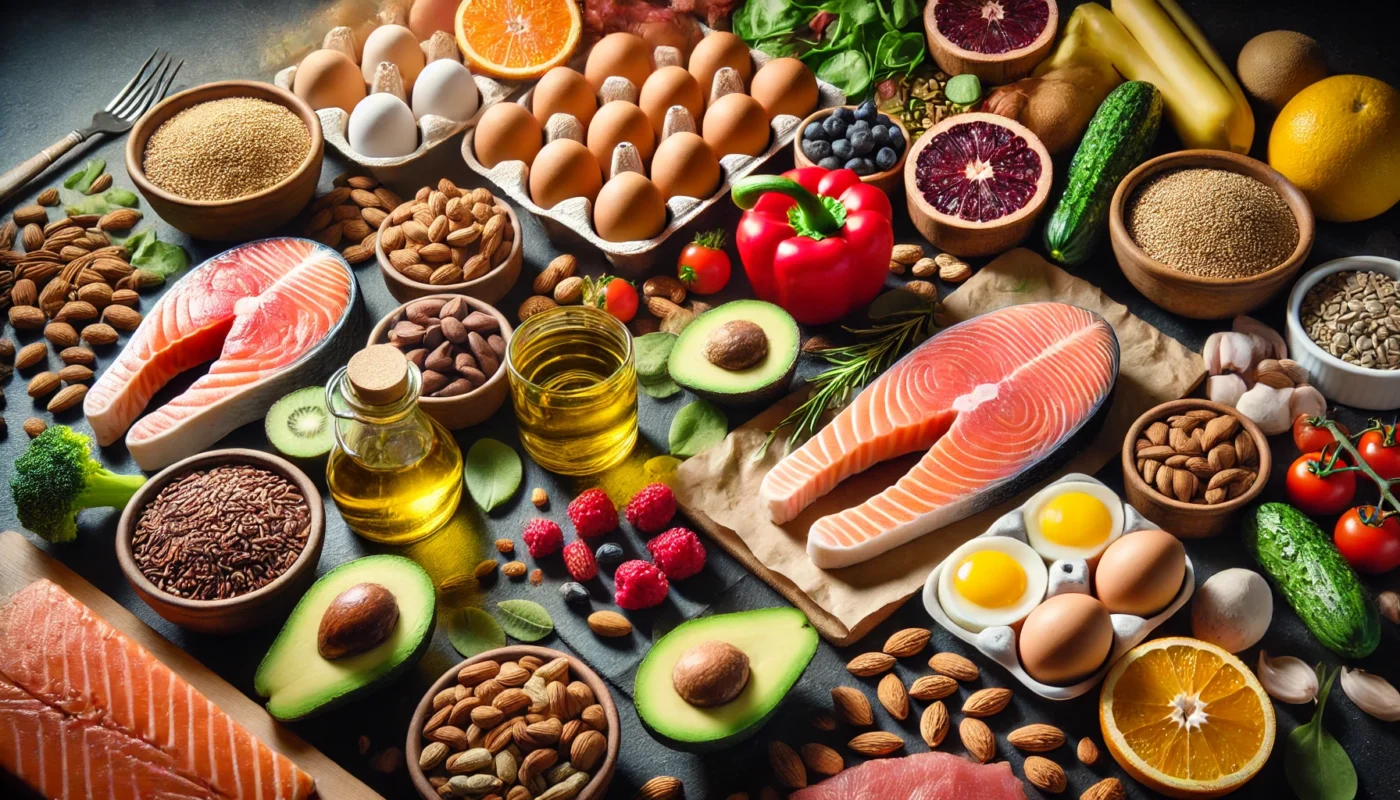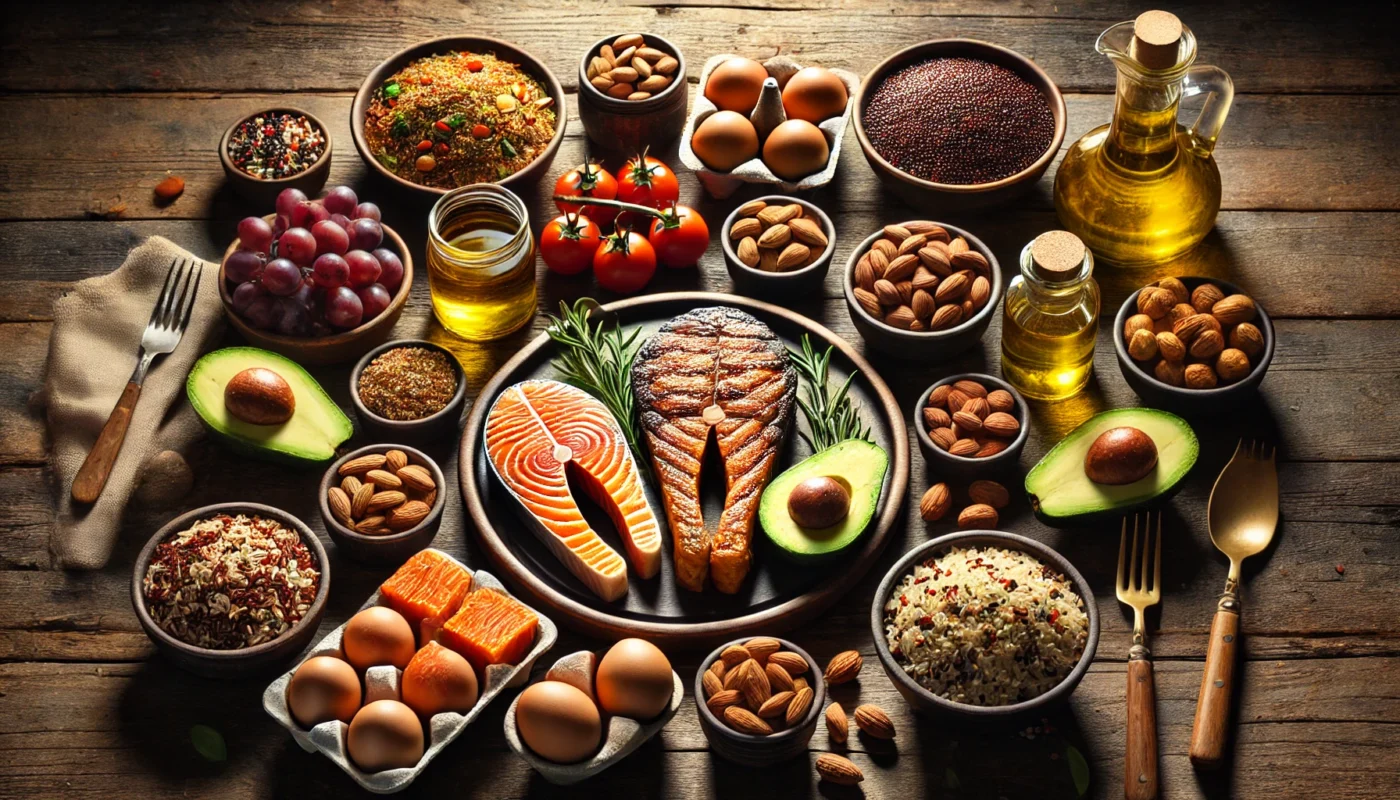Calories are units of energy that our bodies require to function optimally. When it comes to muscle growth, calories play a pivotal role in providing the necessary energy for muscle repair and growth. Simply put, without an adequate caloric intake, muscle hypertrophy is significantly impeded.
You may also like: High Protein Foods to Fuel Workouts

Do Calories Matter When Building Muscle?
Undoubtedly, calories are fundamental to muscle building. The process of muscle hypertrophy involves the repair and growth of muscle fibers, which is an energy-intensive process. Consuming enough calories ensures that your body has the requisite energy to support these physiological processes. Insufficient caloric intake can lead to muscle catabolism, where the body breaks down muscle tissue for energy, counteracting muscle growth efforts.
The Energy Balance Equation
The concept of energy balance is crucial when considering muscle growth. It involves the relationship between the calories consumed and the calories expended. For muscle gain, a caloric surplus is necessary, meaning you consume more calories than you burn. Understanding and applying this balance is essential for facilitating muscle hypertrophy.
The Role of Metabolism in Muscle Growth
Metabolism is the biochemical process that converts food into energy. A faster metabolism can mean more calories burned at rest, while a slower metabolism might require strategic adjustments in caloric intake to ensure muscle growth. Understanding your metabolic rate can help tailor your nutritional strategy for effective muscle gain.
How to Increase Calorie Intake to Gain Muscle
Understanding how to increase your caloric intake strategically is crucial for muscle gain. This involves not only increasing the quantity of food but also focusing on the quality of calories consumed.
Quality vs. Quantity: The Balance of Caloric Intake
When aiming to build muscle, it’s important to distinguish between empty calories and nutrient-dense calories. Nutrient-dense calories provide essential vitamins, minerals, and macronutrients that support overall health and muscle growth. Focus on whole foods like lean meats, whole grains, vegetables, fruits, nuts, and seeds to ensure that your caloric intake is both sufficient and beneficial.
Differentiating Nutrient Sources
Not all foods are created equal when it comes to their nutritional value. It’s important to prioritize nutrient-rich foods over those that are calorie-dense but nutritionally poor. This ensures that every calorie contributes to your muscle-building efforts and overall health.
The Importance of Macronutrient Ratios
Balancing proteins, carbohydrates, and fats is crucial for effective calorie intake. Proteins are vital for muscle repair, carbohydrates provide energy, and fats support hormone production. Striking the right balance among these macronutrients can optimize your muscle growth.
Incorporating Variety in Your Diet
Variety in your diet not only prevents monotony but also ensures a wide range of nutrients. Different foods provide different vitamins and minerals, which are all important for muscle recovery and growth. A varied diet helps maintain motivation and supports long-term muscle-building success.
Practical Strategies for Increasing Caloric Intake
- Frequent Meals: Aim to eat five to six smaller meals throughout the day. This helps increase your calorie intake without overwhelming your digestive system.
Regular meals help maintain steady energy levels and support constant nutrient supply to muscles. It also helps prevent excessive hunger and overeating during meals.
- Calorie-Dense Foods: Incorporate foods high in healthy fats like avocados, nuts, and olive oil, as they provide more calories per gram compared to proteins and carbohydrates.
These foods not only add calories but also contribute essential fatty acids crucial for hormone regulation and cell structure, both important for muscle growth.
- Smoothies and Shakes: These are excellent options for adding calories without feeling overly full. Add nut butters, protein powders, and fruits to increase caloric content.
Liquid calories can be easier to consume and digest, making them a great option for those struggling to meet calorie goals through solid foods alone.
- Mindful Snacking: Choose snacks that are high in calories and nutrients, such as trail mix, yogurt with granola, or cheese with whole-grain crackers.
Snacking strategically can fill gaps between meals, providing a consistent flow of nutrients and energy to sustain muscle recovery and growth.
Monitoring and Adjusting Caloric Intake
To effectively build muscle, it’s crucial to monitor your progress and adjust your caloric intake as needed. Begin by calculating your basal metabolic rate (BMR) and adjust your daily caloric intake to include a surplus that supports muscle growth. Regularly assess your body composition and adjust your calorie intake to continue progressing towards your goals.
Tracking Progress with Technology
Utilize apps and wearable technology to keep track of your caloric intake and expenditure. This data-driven approach can offer insights and help you make informed adjustments to your diet.
Understanding Plateaus and Adjustments
Plateaus in muscle gain are common and often signal the need for dietary adjustments. Increasing calorie intake or varying exercise routines can help overcome these plateaus and reignite progress.
The Importance of Flexibility in Dieting
Muscle-building is a dynamic process, requiring flexibility in your nutritional approach. Being open to altering your diet based on results and feedback from your body is key to sustained progress.

Calories and Muscle Gain: The Science Behind the Strategy
Macronutrient Distribution
For optimal muscle gain, it’s not just about increasing calories but also about the macronutrient distribution within those calories. Proteins, carbohydrates, and fats all play unique roles in muscle development.
Proteins: The Building Blocks of Muscle
Essential for muscle repair and growth, aim for 1.6 to 2.2 grams of protein per kilogram of body weight. Adequate protein intake supports muscle protein synthesis, crucial for hypertrophy.
Carbohydrates: Fuel for Performance
Crucial for fueling workouts and recovery, carbohydrates should make up 45-65% of your total caloric intake. They provide the energy needed for intense training sessions and optimal recovery.
Fats: Supporting Hormonal Balance
Necessary for hormone production and overall health, fats should comprise 20-35% of your total calories. They play a vital role in maintaining hormonal balance, which is essential for muscle growth.
The Role of Timing
Nutrient timing can also impact muscle gain. Consuming a balanced meal with protein and carbohydrates post-workout can enhance muscle recovery and growth. This is often referred to as the “anabolic window,” a period where muscles are particularly receptive to nutrients.
Pre-Workout Nutrition
The foods consumed before a workout prepare the body for exercise. A balanced intake of carbohydrates and proteins can enhance performance and preserve muscle.
Post-Workout Recovery
Post-workout meals rich in proteins and carbohydrates can replenish glycogen stores and facilitate muscle repair. This timing is crucial for maximizing the benefits of your workouts.
Daily Meal Timing
Establishing a consistent eating schedule can aid digestion and nutrient absorption. Regular meal times support energy levels and metabolic health, both important for muscle growth.
Holistic Approaches to Muscle Gain
Muscle growth is not solely dependent on calories and macronutrients. A holistic approach considers other factors such as sleep, stress management, and hydration, which are all integral to muscle development.
Sleep and Recovery
Adequate sleep is crucial for muscle recovery and growth. Aim for 7-9 hours of quality sleep per night to support the hormonal environment necessary for muscle growth.
The Impact of Sleep Quality
Quality of sleep affects recovery and performance. Deep, restorative sleep is when most muscle repair and growth occur, emphasizing the need for good sleep hygiene.
Establishing a Sleep Routine
A consistent sleep schedule can enhance sleep quality. Establishing a bedtime routine aids in signaling the body that it’s time to rest, promoting better sleep.
Addressing Sleep Disruptions
Identifying and mitigating factors that disrupt sleep, such as stress or environmental noise, can improve sleep quality and, consequently, muscle recovery.
Stress Management
Chronic stress can impede muscle growth by increasing the production of cortisol, a hormone that can lead to muscle breakdown. Incorporate stress-reducing practices such as meditation, yoga, or deep breathing exercises into your routine.
Recognizing Stressors
Identifying the sources of stress is the first step in managing it. Understanding personal stress triggers can aid in developing effective coping strategies.
Techniques for Stress Reduction
Incorporating activities such as yoga or meditation can reduce stress levels. These practices promote relaxation and can contribute to a more balanced hormonal environment.
The Role of Mental Health
Mental health significantly impacts physical health and muscle growth. Prioritizing mental well-being supports not just muscle gain but overall quality of life.
Hydration
Water is essential for every physiological process in the body, including muscle growth. Ensure adequate hydration to optimize performance and recovery.
Importance of Consistent Hydration
Maintaining hydration supports metabolic processes and nutrient transport. Consistent water intake is crucial for sustaining energy and promoting muscle recovery.
Recognizing Dehydration Signs
Understanding the signs of dehydration, like fatigue or dizziness, helps in addressing them promptly. Staying hydrated ensures the body functions at its best, supporting muscle growth.
Hydration Strategies for Athletes
Athletes may require specific hydration strategies to meet their needs. Tailoring fluid intake to match activity levels and environmental conditions is key for optimal performance.

Conclusion: Crafting Your Muscle-Building Strategy
Understanding the role of calories in muscle growth is a cornerstone of any effective muscle-building strategy. By focusing on both the quantity and quality of your caloric intake, monitoring your progress, and incorporating holistic health practices, you can optimize your muscle-building efforts. Remember, building muscle is a journey that requires patience, consistency, and a willingness to adapt your strategy as your body evolves.
Setting Realistic Goals
Setting achievable goals helps maintain motivation and focus. Recognizing that muscle growth takes time can prevent frustration and encourage persistence.
Adapting to Your Body’s Needs
Listening to your body and adjusting your strategy accordingly is crucial. Flexibility in your approach ensures that your muscle-building plan remains effective and sustainable.
Embracing the Journey
Building muscle is not a destination but a journey. Embracing the process and learning from each step can make the experience rewarding and fulfilling.
As you embark on this journey, let this guide serve as a roadmap to achieving your muscle-building goals through informed and strategic caloric management.
post-workout meals, muscle growth, nutrition, sleep, stress management, hydration, recovery, holistic health, fitness, meal timing, protein, carbohydrates, mental health, goal setting, athlete hydration, muscle repair
Further Reading:
Can You Build Muscle in a Calorie Deficit?
10 Nutrition Rules to Follow if You Want to Build Muscle
New Research Finds Bulking with High Calories Not Necessary for Building Muscle
Important Note: The information contained in this article is for general informational purposes only, and should not be construed as health or medical advice, nor is it intended to diagnose, prevent, treat, or cure any disease or health condition. Before embarking on any diet, fitness regimen, or program of nutritional supplementation, it is advisable to consult your healthcare professional in order to determine its safety and probable efficacy in terms of your individual state of health.
Regarding Nutritional Supplements Or Other Non-Prescription Health Products: If any nutritional supplements or other non-prescription health products are mentioned in the foregoing article, any claims or statements made about them have not been evaluated by the U.S. Food and Drug Administration, and such nutritional supplements or other health products are not intended to diagnose, treat, cure, or prevent any disease.

